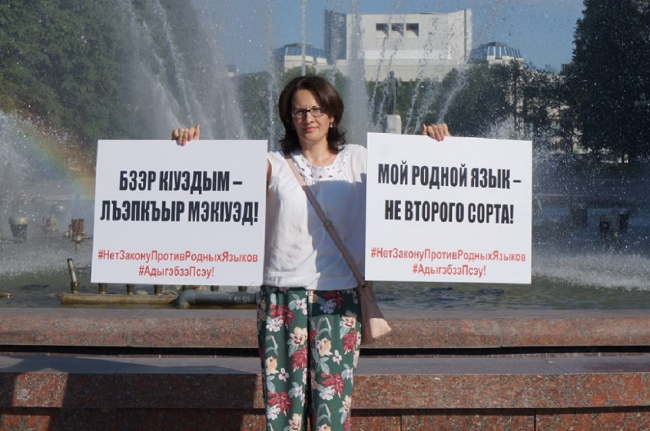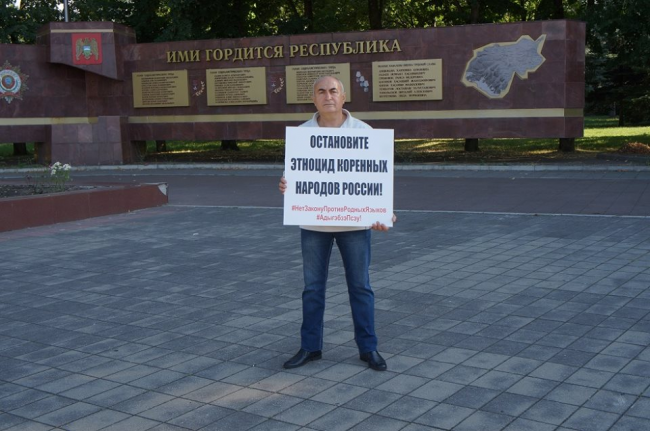

 The authorities in Nalchik, the capital of Kabardino-Balkaria, prohibited a protest against amendments to the federal law On Education which were planned across 12 Russian subjects on 17 July. Activists in Nalchik instead held a number of single person protests against the controversial law two days later.
The authorities in Nalchik, the capital of Kabardino-Balkaria, prohibited a protest against amendments to the federal law On Education which were planned across 12 Russian subjects on 17 July. Activists in Nalchik instead held a number of single person protests against the controversial law two days later.
The protest organisers — leaders of several local civil society groups — announced the demonstration on social media, but the city administration refused to grant permission for the assembly. The administration said they only had the power to grant permission for demonstrations of up to 300 people.
Zaur Zhemukhov, leader of one of the organising groups, Zhegu, told OC Media the city authorities informed them that ‘the phrase “up to 300 people” means a maximum of 299 attendees’, not 300 as the organisers had proposed. Zhemukhov said that officials from the Mayor’s Office told him that only the head of the republic can grant permission for demonstrations involving more than 300 people, although the law states that city authorities also have this power.
‘We rewrote the application, indicating that no more than 299 people would take part, but they rejected it again, saying that it didn’t include the name of an individual to be held responsible for the event’.
‘When the demonstration was forbidden, we decided to organise a smaller protest. We applied again to the Nalchik administration’, said Zaur Zhemukhov.
The city officials denied this application, according to Zhemukhov, because of a lack of clarification about what implements e.g. posters and signs, the protesters would use. In addition, ‘the application should include the slogans and appeals to be presented, so the authorities could check them first for extremism’, Zhemukhov quoted the authorities as saying.
One-person protests
The head of the Kabardino-Balkaria Human Rights Centre, Valery Khatazhukov, told OC Media that demonstrations against the language law were planned on 17 July in 12 of Russia’s federal subjects — Daghestan, Karachay–Cherkessia, Kabardino-Balkaria, Adygea, North Ossetia, Mari El, Sakha–Yakutia, Tatarstan, Chuvashia, Altay, Bashkortostan, and Komi. He said the Russian authorities should listen to their objections.

According to Khatazhukov, on 19 July, nine activists held a series of single-person protests in Nalchik. According to him, these also took place in several other Russian cities.
Khatazhukov wrote on Facebook on 19 July that ‘a group of policemen, led by the Minister for Countering Extremism in Youth, Zalim Kashirokov, urged [the protesters in Nalchik] to proceed to the Government House to discuss the issues there’.
Khatazhukov reportedly contacted the Secretary of the Security Council of Kabardino-Balkaria, Kazbek Tatuyev, who assured him that single-person protesters would not be detained. ‘On the contrary, we want to discuss this problem, therefore we invited them to the Government House’, he said, according to Khatazhukov.
Two hours later, the demonstrators left the Government House after speaking with government officials.
On 19 June, the Russian Duma passed the amendments to the Federal Law ‘On Education’ in their first reading. The amendments, if passed, would make the study of languages of indigenous peoples of the national subjects of Russia voluntary.
Within two weeks, more than 40,000 Russian citizens signed a petition against the law. Arsen Kanokov, a former president of Kabardino-Balkaria and member of the Federation Council, Russia’s upper house, opposed the adoption of the bill in its current form, calling it ‘unreasoned’. All four of the Republic’s MPs in the lower house, the Duma, voted in favour of the reforms, leading to calls for their resignations.






